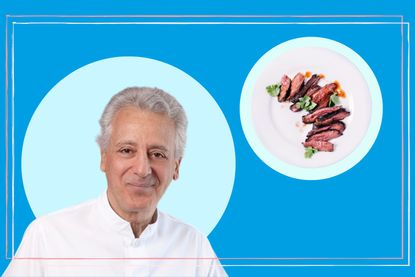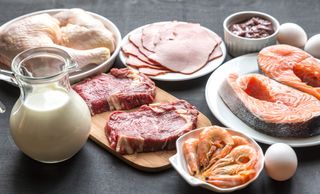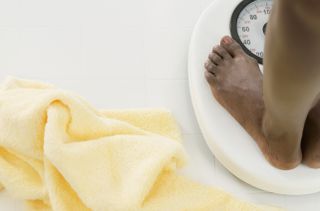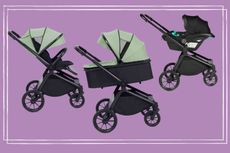The Dukan Diet: Everything you need to know about a high-protein plan
JLO's a fan


Following The Dukan diet, The Duchess of Cambridge reportedly went down two dress sizes ahead of her wedding.
A ‘breakthrough’ diet book by Dr Pierre Dukan. The Dukan diet is a low-fat, high-protein diet that's been credited as one diet that works fast for people who've previously found dieting difficult.
Dr Dukan’s high-protein diet has been a favourite with French women for over 10 years. You need discipline to follow it. The rule is no fruit, no treats, no carbs and stop drinking alcohol for as long as it takes to lose your excess weight.
What is the Dukan diet?
The Dukan diet is a high-protein, low carb, low fat plan made up of four phases which aid weight loss. It was devised by French doctor Pierre Dukan in the 1970s.
The low-carb diet was then prescribed to Dr Dukan's obese patients. After a string of successful results, he shared his findings in 2000, before going on to publish The Dukan Diet book in the UK in 2010.
It's four phases are called: Attack, Cruise, Consolidation and Stabilisation. In the first two, you are limited to the 100 foods permitted, which are used to make up tasty recipes.
The latter two phases are then designed to help you wean off the plan. Thereby ensuring that the weight loss won't go immediately back on after all your hard work.
GoodtoKnow Newsletter
Parenting advice, hot topics, best buys and family finance tips delivered straight to your inbox.
How does the Dukan diet work?
The Dukan Diet is a ketogenic diet that sees dieters eat high protein foods whilst reducing carbohydrates and fats in their diet.
It's analogy is that consuming large quantities of protein will help with weight loss. And science certainly supports this, with one 2015 study finding that those on a high-protein diet burned 260 more calories a day than those on a low-protein plan. This is because protein requires more energy to digest it - which leads to calorie burning.
What's more, one Harvard study also credited protein as helping you to feel fuller for longer. Which is therefore great at reducing the need to snack or over-eat.
As part of the plan, people are given a list of 100 foods they can eat. 72 of these are proteins, whilst the further 28 are vegetables. Dieters start with the 72 proteins, going on to incorporate the vegetables and other food groups as they progress along the phases.
"The Dukan Diet is easy to understand, easy to do and you can eat as much as you like of certain foods so you’re never hungry," Dr Dukan tells us. "The diet is structured so in the first two phases, the Dukan Diet Attack Phase and the Dukan Diet Cruise Phase, you lose weight and in the second two phases, the Dukan Diet Consolidation Phase and the Dukan Diet Stabilisation Phase you maintain weight."
The Dukan diet phases
Phase 1: Attack
"The first stage is the Attack phase, where for 2-7 days you can eat as much as you want of 72-protein rich foods," says Dr Dukan.
These 72 lean protein include:
- Meat: Steak, veal, liver, reduced fat ham, reduced fat bacon, cooked chicken or turkey slices
- Fish: Cod, sole, haddock, salmon, sardines, tuna, shellfish
- Dairy: Virtually fat-free cottage cheese, virtually fat-free quark, fat-free yogurt, skimmed milk, eggs and tofu.
Unlike the Atkins diet, Dukan asks dieters to forego fats to help acheive weight loss in the first two phases.

An example Dukan diet meal plan in the Attack phase could be...
Breakfast: Fat-free yogurt Dukan pancake - Stir 1½tbsp oat bran with 1½tbsp non-fat fromage frais, 1 egg, sweetener or salt. Cook for 2 mins each side. Serve with Dukan nutella (1 egg yolk, 1tsp reduced-fat cocoa powder, 2tbsp sweetener and a little water).
Lunch: Egg, smoked salmon and Dukan mayonnaise - Combine 1 egg yolk and 1tbsp Dijon mustard. Season and add 1tbsp chopped parsley or chives. Gradually stir in 3tbsp virtually fat-free fromage frais or quark.
Dinner: Rosemary meatballs - Mix 1 diced onion; 750g minced beef; 2 crushed garlic cloves; 1 egg, lightly beaten; 1tbsp Worcestershire sauce; 2tbsp Chinese plum sauce; 2tbsp rosemary, 1-2tbsp mint or basil, all finely chopped; salt and black pepper. Shape into balls the size of a walnut. Cook in batches over a medium heat, for 5 mins or until golden. Drain away fat before serving.
Phase 2: Cruise
"Next is the Cruise phase where you continue to eat the protein rich foods with the addition of 28 vegetables," Dr Dukan explains.
The idea is to alternate days of protein only with protein and vegetable days. And you stay on Cruise until you have lost all the weight you want to shed.
The 28 prescribed vegetables include:
- Artichoke, fennel, onions, asparagus
- French beans, aubergine, leek, beetroot
- Courgette, mushrooms, broccoli, cabbage
- Pepper, carrots, pumpkin, celery
- Tomatoes, salad leaves and swede
An example protein and vegetable day in the Attack phase could involve...
Breakfast: Fat-free yogurt Dukan pancake Same as phase 1
Lunch: Quick gazpacho - Poach 4 tomatoes in boiling water for 30 secs, then peel and deseed them. Grill 1 red pepper and 1 green pepper for 10-15 mins until charred. Place in a plastic bag to cool, before peeling away the skin and seeds and cutting into chunks. Blend the tomatoes and peppers with 2 cucumbers (peeled, deseeded and chopped) and some mint in a blender. Season and serve chilled.
Dinner: Chicken with mushrooms - Thinly slice 600g button mushrooms. Sprinkle over a few drops of lemon juice and put them in a non-stick casserole dish. Season, cover and cook over a gentle heat until all their water has evaporated. Drain and put to one side. Brown 1 chopped onion in a casserole dish in a little water. Add 800g chicken breasts, cut into cubes; 2 chopped tomatoes; the mushrooms; 2 chopped garlic cloves; 250ml low-salt chicken stock; salt and pepper. Cover and cook over a gentle heat for 20 mins.
Phase 3: Consolidation
Once you have reached your goal weight, the Dukan diet moves on from the 100 natural foods to allow other foods.
"The third stage is the Consolidation phase where you can add fruit, bread, cheese and starchy foods plus two celebration meals a week," says Dr Dukan.
This means that one evening a week you can eat whatever you like (within reason). And this increases to two evenings a week in the later end of the Consolidation phase. Meanwhile, Thursday remains a protein-only day to help you keep to your goal weight.
You can calculate how long you need to stay on Consolidation by multiplying every pound you lost by five. For example, 7lb x 5 = 35 days.
Consolidation phase food rules:
- As much protein and vegetables (together) each day (except Thursdays - your protein only day)
- 1 fruit a day – but not high sugar bananas, grapes, cherries or dried fruits. Watermelon, an apple or papaya are best.
- 2 slices wholemeal bread per day, with reduced-fat butter.
- One serving (40g) of hard cheese per day – avoid blue cheese, soft cheese or goat’s cheese.
- One serving per week of ‘starchy foods’ such as pasta or rice in the first half of your Consolidation phase, increasing to two portions per week in the second half. Think pasta and tomato sauce. You may also have chickpeas, lentils, couscous, polenta and potatoes.
- Relax a little and enjoy one night out or ‘special’ meal in the first half of your Consolidation phase, increasing to two in the second half. In this meal you really can eat anything you like!
Phase 4: Stabilisation
Most of the hard work is done. Now you can enjoy eating and drinking normally, but whilst following a few of Dr Dukan's rules.
"Finally you have the Stabilisation phase where you can eat what you like without regaining weight by following 3 simple rules," he says.
- Good food choices: "Adopt a 'safety platform' using the basic foods from the Consolidation phase."
- Oat Bran: "Three tablespoons of oat bran a day for life."
- Thursdays: "Make every Thursday a protein only day."
Exercise continues to be encouraged during the final stage. The plan recommends taking the stairs over the lift and getting your sweat on for 20 minutes each day.
It's also important that you drink plenty of water too - aim for 1.5 litres of H20 daily.
How much weight can you lose on the Dukan diet?
Research has shown that dieters can lose up to 2 and a half stone on the Dukan diet.
One Polish study followed a group of women on the plan for 8-10 weeks. And they found that overall the average weight loss recorded "was approximately 15 kilograms."
"Many people have lost lots of weight on the plan and by eating the Dukan diet recipes but it depends how much you need and want to lose," Dr Dukan tells us. "The main thing is getting to your true and natural weight and maintaining it."
On the Dukan diet they deem your true weight as "the weight you can reach without struggling, affecting your mood or your health. It is also the weight you can maintain long term without difficulty, hunger, and restricted eating."
This goal weight takes into consideration factors like sex, age and height. Plus the heaviest and lightest weight you have been in your life.
Is the Dukan diet a suitable long-term plan?
Whilst there are some nutritional benefits, health experts do not consider the Dukan diet as a suitable long-term plan.
"The Dukan diet promotes a diet high in animal protein and low in carbohydrates for 'sustainable' weight loss," says nutritionist Ellie Busby. "But there are several problems with this method for weight loss."
She recognises that Dukan is a ketogenic diet and that studies have proven these to lead to weight loss. However, dieters can expect to see the weight return rather fast after.
"The problem with these restrictive diets is that they do work in the short-term for weight loss. But people can't sustain them longer than around 6 months and end up putting all the weight they lost back on.
"They are also stressful to stick to and make socialising difficult because you can't easily eat out," she adds.

Dukan diet pros and cons
✅ No processed foods: "All the food in the Dukan Diet recipes are natural," says Dr Dukan. "And avoiding processed foods where possible will only benefit your health. No processed meats or fish. It’s like what we used to eat years ago, so it’s the healthiest diet possible."
✅ High fat foods: The diet encourages both animal and plant fats including butter, fish, olive and sunflower oils. These contain vitamins, polyphenols polyunsaturated fats which are considered to be heart-healthy.
✅ Filling meals: Remember the Dukan diet advocates that you can eat as much of the prescribed foods as you like. One Amazon reviewer of the diet book commented: "I don’t feel hungry and the meals are completely satisfying and filling."
❌ Water weight loss: The initial weight you lose will be mainly water. A temporary state, the pounds are likely to return when you come off the diet.
❌ Missing key nutrients: The first phase doesn't allow any vegetables and it's not until the third phase that dieters are allowed to eat fruits (again only select ones). This means that your body will be missing out on vital minerals and nutrients that are needed to help it function properly.
❌ Negative side effects: TOWIE star Maria Fowler said the diet of oat bran and protein led to mood swings, headaches and hunger pangs, as well as bad breath and constipation.
❌ Not suitable for those with certain conditions: It's important that anyone with kidney and liver problems or people susceptable to gout consult with a doctor before beginning. One Polish study found that women on Dukan long term were susceptible to kidney and liver disease, osteoporosis and cardiovascular disease.
❌ Increased risk of urinary stones: The author of one Italian study said that ketogenic diets like Dukan can cause urinary stones. "Subjects with a known history of stone disease should not undergo these diets at all," he warns.
❌ Expensive: The Dukan diet is a lot of protein like lean meat and fish, which can often be expensive and add up during the weekly shop.
❌ Boring: EastEnders actress Lacey Turner found the diet rather monotomous. "It’s so boring…eating as much as you want might not feel all that satisfying following meal after meal of poached chicken and steamed broccoli,” she said.
❌ Hard to follow: If you're someone with a busy schedule, kids to look after and a packed social life, sticking to the strict rules might prove problematic.
The Dukan diet - a nutritionist's verdict?
For nutritionist Ellie Busby, the Dukan Diet is a hard no:
"I would strongly discourage anyone from following the Dukan diet and encourage a whole food plant-based approach for sustainable weight loss," she tells us. "As previously stated, the Dukan diet is very restrictive. Studies show that only 6% of people who lose weight manage to maintain it."
Whilst Ellie appreciates that protein is more filling than carbohydrates and fat, it's high consumption of animal protein is alarming.
"Eating too much animal protein can increase the risk of heart disease, stroke, diabetes and other chronic illnesses in some people. On the other hand, plant-based proteins provide lots of other healthy nutrients such as fibre, antioxidant phytonutrients, vitamins and minerals. Fibre is important to fill you up and feed the right bactiera in your microbiome, which is also important for weight loss."
We spoke to the following experts for this piece:

Ellie Busby is a registered nutritionist and a member of The British Association for Nutrition and Lifestyle Medicine. With a background in biochemistry, she studied Chemistry (BSc) at University of Bristol and has a (MSc) in Clinical Nutrition from the University of Worcester, and has published work in a peer-reviewed journal. The founder of Vojo Health, she is passionate about personalised nutrition.
Video of the Week:

Emily Stedman is the former Features Editor for GoodTo covering all things TV, entertainment, royal, lifestyle, health and wellbeing. Boasting an encyclopaedic knowledge on all things TV, celebrity and royals, career highlights include working at HELLO! Magazine and as a royal researcher to Diana biographer Andrew Morton on his book Meghan: A Hollywood Princess. In her spare time, Emily can be found eating her way around London, swimming at her local Lido or curled up on the sofa binging the next best Netflix show.
-
 What is a travel system? Baby gear experts explain how they work - and what’s included
What is a travel system? Baby gear experts explain how they work - and what’s includedExperts decode what is a travel system and offer tips on how to find the best one for you
By Charlotte Duck Published
-
 Magic Mixies Pixlings are a bestseller - but are they worth the money? We put this toy through its paces to find out
Magic Mixies Pixlings are a bestseller - but are they worth the money? We put this toy through its paces to find outMagic by name and magic by nature? We review Magic Mixies Pixlings to see if it lives up to the hype
By Sarah Handley Published